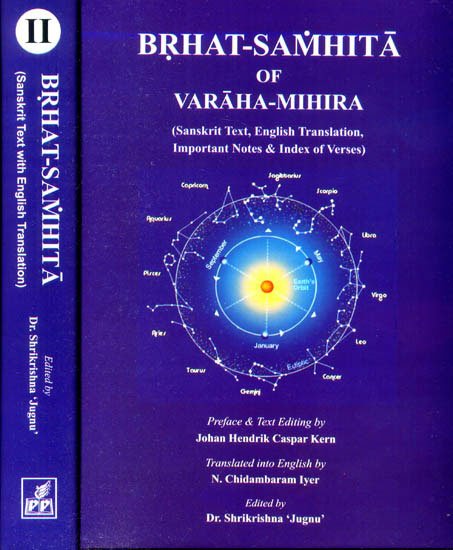Brihat Samhita
by N. Chidambaram Iyer | 1884 | 135,584 words | ISBN-13: 9788171104215
This page describes five elementary principles that compose the physical man which is the seventh Appendix of the English translation of the Brihat-samhita. This work, written by Varahamihira in the 6th century, is classified as jyotisha literature, also known as Indian astronomy. It contains however, also content regarding astrology, palmistry, agriculture, gardening, perfumes, medicines and various other encyclopedic topics.
Appendix 7 - The five elementary principles that compose the physical man
Note: This appendix is extracted at the end from chapter 68 of the Bṛhat-saṃhita.
Physical man is composed of the five elementary principles—earth, water, fire, air and ether. The lords of these are respectively Mercury (earth), Venus and the Moon (water), Mars and the Sun (fire), Saturn (air), and Jupiter (ether). Human life is divided, into a number of Daśā periods presided over by the several planets (vide chapter-8 of Bṛhat Jātaka). In the period of a particular planet will predominate the elementary principle belonging to him, and therefore, the complexion due to such principle will become discernible in such Daśā period. Suppose the Daśā period to be that of Mars, his element is fire; the complexion caused by the elementary principle of fire is described in stanza 93. This complexion will become discernible in the Daśā period of Mars; and so for the other planets.
Again, in stanza 21 of chapter-8 of his ‘Bṛhat Jātaka’, Varāha Mihira states that the complexion will be accompanied by certain other qualities due to the five elementary principles and discernible by their respective organs of sense. The main property of earth is smell, a quality discernible by the nose; that of water is taste, a quality discernible by the tongue; that of fire or light is shape or appearance, discernible by the eye; that of the air is touch, discernible by the body; and that of Ākāśa is sound, discernible by the ear. Now suppose the Daśā period to be that of Venus. His element is water; the quality belonging to water is taste, discernible by the tongue; therefore in the Daśā period of Venus, the person will eat juicy meals according to his desire. Again, suppose the Daśā period to be that of Jupiter, his elementary principle is Ākāśa; its property is sound, discernible by the ear; the person’s speech will be sweet and agreeable to the ear. In the Daśā period of Mercury (earth, smell) the person’s body will be with an agreeable odour: in the period of Mars (fire, sight), he will be of agreeable appearance, and in that of Saturn (air, touch), he will be of soft body. From these the particular Daśā period of a person may be ascertained.
